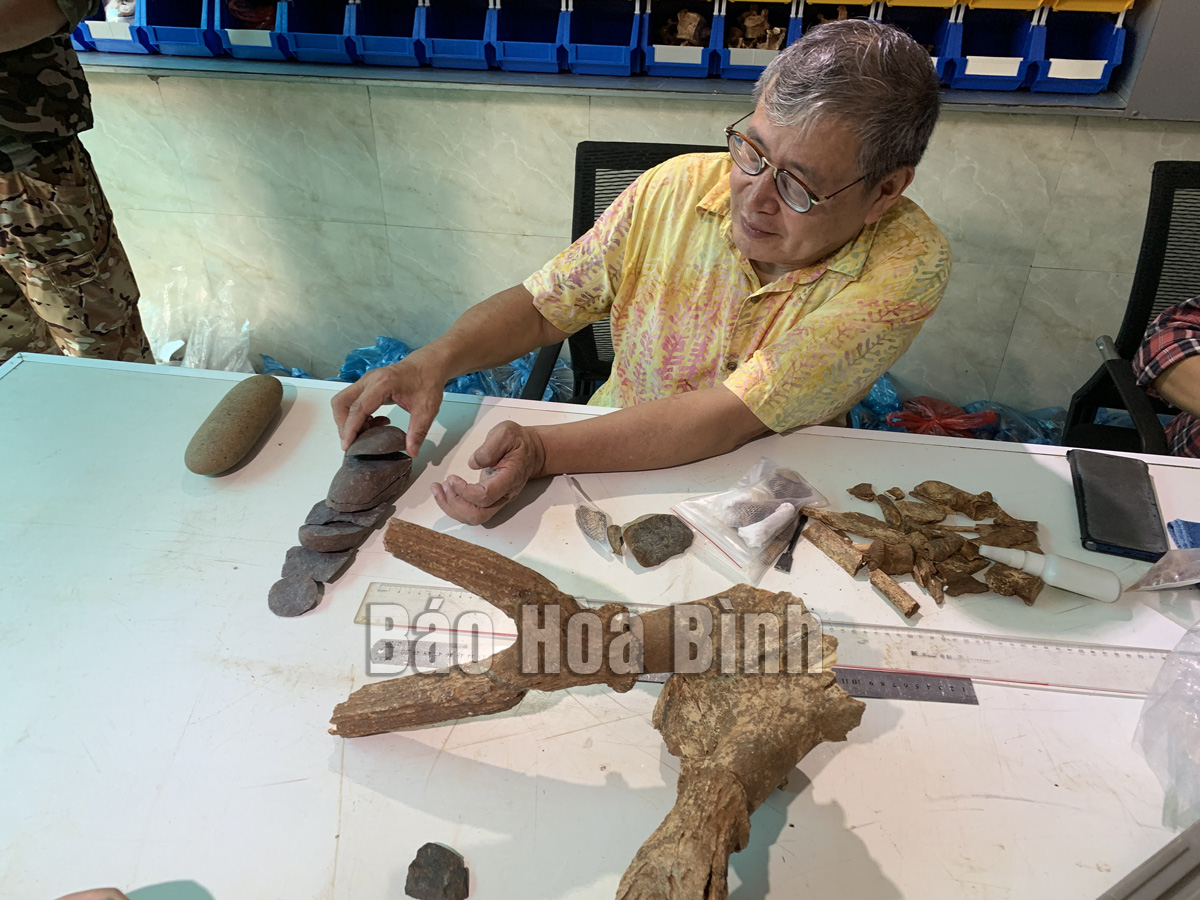
(HBO) – The Museum of Hoa Binh province has coordinated with the Centre for Southeast Asian Prehistoric Studies and the Vietnam Institute of Archaeology to excavate the Trai Hamlet cave and the Vanh Village stone shelter in Lac Son district, which are national archaeological relic sites and also home to diverse and outstanding items dating back to the Hoa Binh Civilisation.
Dr. Nguyen Viet, Director of the Centre for Southeast Asian Prehistoric Studies, introduces the items collected during the recent excavation of two archaeological sites in Lac Son district.
The excavation aimed to collect more scientific data about the Hoa Binh Civilisation in the province, gain an insight into the local history and culture, and serve display at the Provincial Museum.
The activity covered 50sq.m. at the Vanh Village stone shelter and 20sq.m. at the Trai Hamlet cave, collecting a number of stone and bone tools and burned rice grains.
Luu Huy Linh, Deputy Director of the provincial Department of Culture, Sports and Tourism, said the items have been sent to the Centre for Southeast Asian Prehistoric Studies for examining their age and value. Given the sites’ values, the department will propose the provincial People’s Committee work to seek the recognition of these places as special national relic sites and devise more measures for preserving and bringing into play their values.
The Trai Hamlet cave in Tan Lap commune was where the oldest vestiges of the Hoa Binh Civilisation in the Red River Delta were found. Discovered in 1975, this site has been excavated for many times by scientists. More than 5,000 objects have been collected since then, indicating that this was a long-term place of residence and also a tool making workshop of humans in the Hoa Binh Civilisation. So far, it is home to the most diverse stone and bone tools among the excavated relic sites of this civilisation. The cave could be classified as a site dating back to the early period of the New Stone Age.
Meanwhile, the Vanh Village stone shelter in Yen Phu commune was discovered by M. Colani in 1929. Research findings revealed by the French archaeologist in 1930 showed that this place dates back 17,000 - 18,000 years ago, which was the middle period of the Hoa Binh Civilisation.
Dr. Nguyen Viet, Director of the Centre for Southeast Asian Prehistoric Studies, said with the large number of tools, evidence of humans’ long-term residence, and the first fine art traces found in Vietnam, the Trai Hamlet cave and Vanh Village stone shelter could be recognised as special relic sites. All the items collected from these places will be handed over to and preserved at the Hoa Binh Provincial Museum to serve research and exhibition purposes to bring into play their values and meet the public’s demand./.
With an increasingly vibrant and widespread emulation movement aimed at building cultured residential areas and cultured families, Yen Thuy District has been making steady progress toward improving both the material and spiritual well-being of its people, while fostering a civilized, prosperous, beautiful, and progressive community.
Once lacking recreational spaces and community facilities, Residential Group 2 in Quynh Lam Ward (Hoa Binh City) has recently received attention for the construction of a new, spacious, and fully equipped cultural house. The project followed the model of state support combined with public contributions in both labor and funding.
The "All people unite to build cultural life" movement, which has been effectively integrated with Kim Boi district’s socio-economic development goals, is fostering a lively spirit of emulation across local residential areas, hamlets, villages, public agencies, and enterprises. In addition, through the initiative, traditional cultural values are being preserved and promoted, while community solidarity and mutual support in poverty reduction and economic development are being strengthened.
A working delegation of the Hoa Binh provincial People’s Committee led by its Permanent Vice Chairman Nguyen Van Toan on June 11 inspected the progress of a project to build the Mo Muong Cultural Heritage Conservation Space linked to tourism services in Hop Phong commune, Cao Phong district.
Born and growing in the heroic land of Muong Dong, Dinh Thi Kieu Dung, a resident in Bo town of Kim Boi district, in her childhood was nurtured by the sweet lullabies of her grandmother and mother. These melodies deeply imprinted on her soul, becoming an inseparable part of her love for her ethnic group's culture. For over 20 years, this love for her hometown has driven Dung to research, collect, and pass down the cultural values of the Muong people to future generations.
In the final days of May, the Ethnic Art Troupe of Hoa Binh Province organized performances to serve the people in remote, mountainous, and particularly disadvantaged areas within the province. These were not just ordinary artistic shows, but they were the meaningful journeys aimed at spreading cultural values, enhancing the spiritual life of the people and contributing to the preservation of ethnic minority cultural identities.



